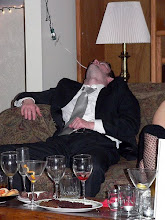 |
| "Fire my agent." |
If 1967's Casino Royale is half as clever as it thinks it is, it will go down as one of the great comic masterpieces of all time. That most people don't even know it exists tells you how that turned out for everyone.
Backing up: It's 1967. Five years since Dr. No and arguably the height of the spy-fi genre. The airwaves and silver screens are flooded with parodies, pastiches, and cash-ins. Now, way back in 1954, Ian Fleming sold the rights to his first novel, Casino Royale, for a six hundred dollars. The book was adapted into an episode of the American anthology TV series Climax! and would bounce about during the Sixties before producer Charles Feldman bought them, intending at first to produce a straight James Bond film. He even went so far as to approach Sean Connery, and when he couldn't get him, twisted the plot of Casino Royale around toward a parody. The film rights to Fleming's novel would languish for decades after before eventually going to Sony, which has the current lease on the character, in 1999, for ten million dollars.
As spoofs and homages go, Casino Royale is the only one with pedigree. It's the only spy spoof that can have a character named James Bond (played by David Niven, Ian Fleming's original choice for the character) offer commentary of the genre popularized by films starring a character named James Bond. Thing is, this meta-commentary is disingenuous. Niven's Bond bemoans the fact that "secret agent has become synonymous with 'sex maniac,'" but that's what those books were. The original film adaptations of Fleming's novels were fairly faithful to the source material (except You Only Live Twice, also released in '67). Niven's Bond is a refined, eccentric British gentleman, who declares spying an alternative to outright war, but for whom it feels more like a diversion, an outlet for his eccentricities, a hobby. Niven never gives the sense, in this movie or any other I've seen him in, as particularly exerting himself at anything.
Perhaps Niven's Bond is speaking more to the rest of the genre that sprang up over his filmic alter-ego. [[put list here, instead]] In an effort to out-Bond Bond, these parodies and pastiches upped the camp factor, upped the gadget factor, and way upped the girl factor.
 |
| Bernard Lee, Lois Maxwell, and Neil Connery |
There are some funny bits in Casino Royale, but only if you, like me, are partial to Dad Jokes. Casino Royale is a very Dads' Interest film, employing not only lame puns, but also an entire regiment of lissome lady thespians to lob juvenile sexual innuendo that in 1967 was probably pretty racy. It bears a strong resemblance to the Carry On! series of films in that regard, the kind of ham-fisted attention grabbing that throws pretty girls and eye-roller jokes at the wall to distract you from the fact that nothing is really happening. Sometimes this works. Just as often it does not.
 |
| Some memorably off-kilter set design as well. |
An interesting note: this film is the first instance of what would become a popular (but easily discredited) fan theory surrounding the character of James Bond: that the name is a code name. That Timothy Dalton and Pierce Brosnan and Roger Moore all had different names, that the name "Bond" is as much a designation as "007." In Casino Royale, the original Sir James Bond recruits his old flame Vesper Lynd, some dude who was famous in 1967, a professional baccarat player, and his own daughter (by Mata Hari!) to work under the name "James Bond 007," a largely nonsensical gag that Niven's character seems to grow increasingly tired of, despite having invented it.
 |
| Mata Bond. Looking pretty good for fifty. |
About fifteen minutes of this two-hour picture is devoted to the classic elements of Fleming's novel. A man, named James Bond, facing off against a man, named Le Chiffre in a game of baccarat in order to bankrupt Le Chiffre. Everything else that swirls about it, including an interminable sequence in Scotland at the beginning of the film and a chaotic battle played for wacky laffs at the film's end, is a nonsensical parade of half-baked ideas, limp jokes, and visual gags that sometimes work.
 |
| Also, there is a flying saucer. |




No comments:
Post a Comment